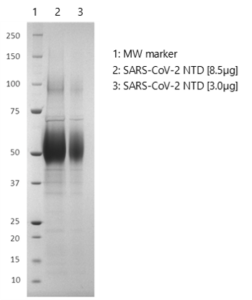SARS-CoV-2 Spike N-Terminal Domain (NTD), His-Tag (HEK293)
Price range: $697.88 through $2,659.10 excl. VAT
Recombinant SARS-CoV-2 Spike protein N-terminal domain (NTD). This domain shows the lowest sequence ID compared to SARS-CoV Spike protein. The protein is produced in HEK293 cells and purified from culture supernatant by affinity chromatography. SARS-CoV-2, previously known as the 2019 Novel Coronavirus (2019-nCoV), causes the pandemic COVID-19 disease.
SARS-COV-2 SPIKE N-TERMINAL DOMAIN (NTD), HIS-TAG (HEK293)
Recombinant SARS-CoV-2 Spike protein N-terminal domain (NTD). This domain shows the lowest sequence ID compared to SARS-CoV Spike protein. The protein is produced in HEK293 cells and purified from culture supernatant by affinity chromatography.
PRODUCT DETAILS – SARS-COV-2 SPIKE N-TERMINAL DOMAIN (NTD)
- SARS-CoV-2 Spike protein N-terminal domain (NTD) (NCBI Accession Number: YP_009724390.1).
- Recombinant protein manufactured in HEK293 cells and purified from culture supernatant by immobilised metal affinity chromatography and anion exchange chromatography.
- Contains Spike protein 1-260, with C-terminal His-tag.
- Presented in Dulbecco’s phosphate buffered saline (DPBS).
BACKGROUND
SARS-CoV-2 is a respiratory virus which causes coronavirus disease 2019 (COVID-19). This disease spreads primarily through contact with an infected person via respiratory droplets generated when a person coughs or sneezes, or through droplets of saliva or discharge from the nose. Infection with SARS-CoV-2 can cause mild symptoms including a runny nose, sore throat, cough, and fever. However, it can be more severe for some people and can lead to pneumonia or breathing difficulties. The elderly, and people with pre-existing medical conditions (such as, diabetes and heart disease) appear to be more vulnerable to becoming severely ill with the virus (WHO, 2020).
The coronavirus spike (S) glycoprotein is a class I viral fusion protein on the outer envelope of the virion that plays a critical role in viral infection by recognizing host cell receptors and mediating fusion of the viral and cellular membranes (Li, 2016). Each monomer of trimeric S protein is about 180 kDa, and contains two subunits, S1 and S2, mediating attachment and membrane fusion, respectively. Two major domains in coronavirus S1 have been identified, the N-terminal domain (S1-NTD) and C-terminal domain (S1-CTD). Either or both of these S1 domains can function as a receptor-binding domain (RBD), depending on virus; SARS-CoV and MERS-CoV both use C-domain to bind their receptors (Ou et al., 2020). Angiotensin-converting enzyme 2 (hACE2)21 and human dipeptidyl peptidase 4 (hDPP4)22 have been identified as the receptors for SARS-CoV and MERS-CoV, respectively. While S proteins of SARS-CoV-2 share about 76% amino acid identities with SARS-CoV, the amino acid sequence of potential RBD of SARS-CoV-2 is only about 74% homologous to that of SARS-CoV. It has been reported that human ACE2 is also the entry receptor of SARS-CoV-2, and that a serine protease is important for SARS-CoV-2 Spike activation (Hoffmann et al., 2020).The RBD is responsible for binding to ACE2, whereas the function of NTD is not well understood. In some coronaviruses, the NTD may recognize specific sugar moieties upon initial attachment and might play an important role in the prefusion-to-postfusion transition of the S protein. For example, the NTD of the MERS-CoV S protein can serve as a critical epitope for neutralizing antibodies (Zhou et al., 2019) and Chi et al. identified an antibody that potently neutralizes SARS-CoV-2 by binding to the NTD. These results strongly suggest that the NTD is a promising target for therapeutic mAbs against COVID-19 (Chi et al., 2020).
REFERENCES
- Chi X, Yan R, Zhang J, Zhang G, Zhang Y, Hao M, Zhang Z, Fan P, Dong Y, Yang Y, Chen Z, Guo Y, Zhang J, Li Y, Song X, Chen Y, Xia L, Fu L, Hou L, Xu J, Yu C, Li J, Zhou Q, Chen W. A neutralizing human antibody binds to the N-terminal domain of the Spike protein of SARS-CoV-2. Science. 2020 Aug 7;369(6504):650-655.
- Hoffmann M, Kleine-Weber H, Schroeder S, et al. (2020). SARS-CoV-2 Cell Entry Depends on ACE2 and TMPRSS2 and Is Blocked by a Clinically Proven Protease Inhibitor. Cell. 2020;S0092-8674(20)30229-4.
- Li F. (2016). Structure, Function, and Evolution of Coronavirus Spike Proteins. Annu Rev Virol. 2016;3(1):237–261.
- Ou X, Liu Y, Lei X, et al. (2020). Characterization of spike glycoprotein of SARS-CoV-2 on virus entry and its immune cross-reactivity with SARS-CoV. Nat Commun. 2020;11(1):1620.
- Novel coronavirus (2019-nCoV), World health Organisation (WHO), 2020.
- Zhou H, Chen Y, Zhang S, Niu P, Qin K, Jia W, Huang B, Zhang S, Lan J, Zhang L, Tan W, Wang X. Structural definition of a neutralization epitope on the N-terminal domain of MERS-CoV spike glycoprotein. Nat Commun. 2019 Jul 11;10(1):3068.


